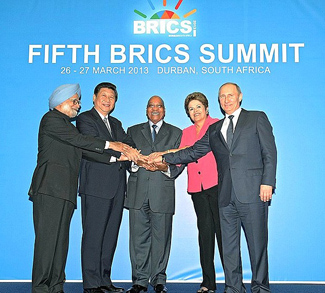For most of this year, emerging market stocks have had a hard time participating in the stock rallies that have been present in the developed world. This might come as a surprise to some, as the underlying logic tends to be that a rising tide lifts all boats and that strong rallies in one area of the world should translate into other regional areas, as well. But the interconnected nature of global financial markets is more complicated than that and it is important for investors to understand the main factors at work in order to best position for new trending moves that might be present in the future.
When dealing with these issues, a good deal of importance should be placed on the monetary policy outlook at the US Federal Reserve. This is because the Fed is widely viewed as the first major central bank likely to begin raising interest rates before the end of this year. If these projections are accurate, credit will become more expensive and consumer spending activity in the US will likely begin to slow. Activity like this places key limitations on one of Indonesia’s key export markets, so there is a strong chance that increases in interest rates will have a material impact on the ability of Indonesian companies to generate improved revenue growth into next year.
Of course, this does not mean that stock markets in Indonesia will fall forever. But it is important to note that interest rate speculation in the US has created a more negative outlook for Indonesian stocks in the near-term. In the chart above, we can see market valuations for the iShares MSCI Indonesia Market Index Fund (NYSEARCA:EIDO) dating back to the beginning of last year. EIDO is one of the most commonly watched gauges of stock performance in Indonesia as a whole and for most of that time, we have seen steady declines in market valuations. This activity coincides well with rising expectations that the Federal Reserve would tighten monetary policy in the U.S. So for those that are interested in gaining exposure to stock markets in Southeast Asia (and Indonesia, in particular), it makes a good deal of sense to remain aware of any changes in the interest rate policy agenda that is present in the United States.
Any suggestions that the Fed is willing to hold-off on raising rate will likely be positive for emerging market stocks. But if we start to see any direct commentaries made which highlight a need for higher interest rates in the US, we could see additional declines in these types of assets. At this stage, an interest rate increase of just one-percent would likely send valuations in Indonesian benchmarks like EIDO back below its all-time lows of around 21.90. From a psychological perspective, a move like this could create a wave of panic selling for stocks in Southeast Asia and in emerging market assets as a whole. Because of this, it makes little sense to start gaining significant long exposure in this sector of the market.
Of course, this does not mean that investors should avoid buying into emerging markets. Indonesia is still the fourth-largest country in the world in terms of population and it is a country that tends to receive less attention in the financial media when compared to nations like India and China. So, for those with a longer-term outlook, there is still good value to be had in assets like EIDO. But the prudent investor will be the one that waits until the US Federal Reserve starts raising interest rates so that rest of the market has the opportunity to offer these stocks at on-sale prices.
The opinions, beliefs, and viewpoints expressed by the authors are theirs alone and don’t reflect any official position of Geopoliticalmonitor.com.





